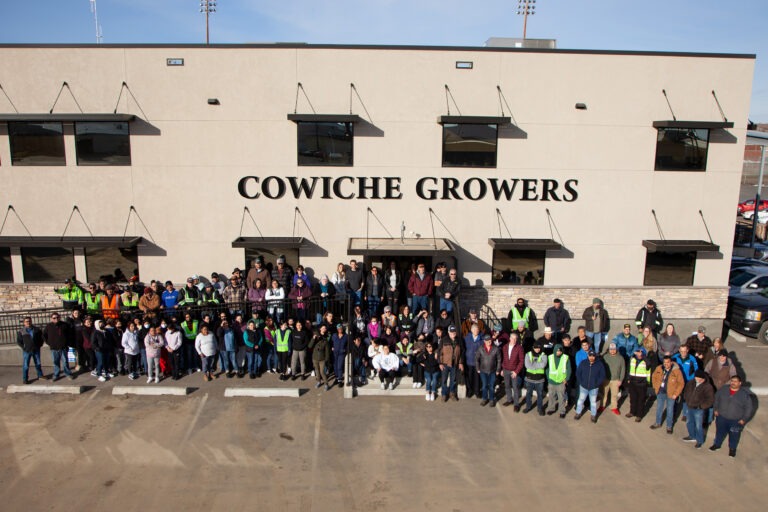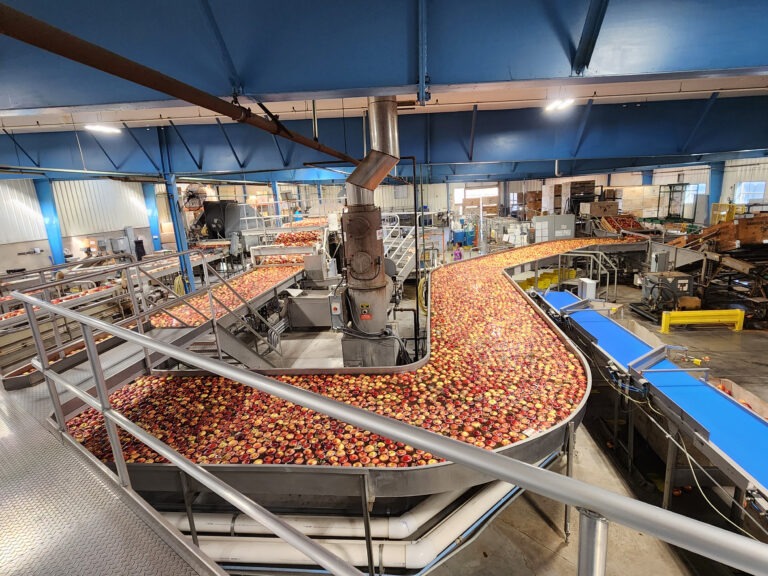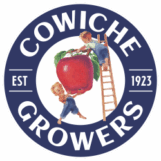Making Cowiche and the Surrounding Communities a Better Place for All
since 1923
The facilities of Cowiche Growers are located in the beautiful Upper Yakima Valley in the state of Washington. Established in 1923, this grower owned cooperative currently consists of more than 65 members who farm approximately 3,000 acres, producing some of the world’s finest apples, pears and cherries. The volcanic and alluvial soils in the valley are rich and the growing season long. The warm days and cool nights naturally enhance the color, crispness, and quality of the fruit.

Grower-Owned
As a grower owned cooperative, Cowiche Growers provides cold storage and packing facilities for its members. Modern, state–of- the-art packing facilities and controlled atmosphere storage enables us to provide high quality fruit to our customers all year long.

Modern Facilities
Our modern facilities, situated on 27 acres, are centrally located to the farms, allowing for quick and functional procession from the tree to the packed box. Our fruit is sold through Domex Superfresh Growers, one of the top fresh fruit marketing firms in Washington State.
1922
Our Founding
Early in the winter of 1922, a small group of local fruit growers got together and decided to form a cooperative organization to pack and sell their fruit. These sixteen charter members agreed to sign a note for $100 per acre of bearing fruit and sign contracts guaranteeing delivery of their produce to this new warehouse.
1923 - 1931
1923 – 1931
Construction on the warehouse began in April of 1923, Overseen by our first General Manger, Walter Praetorius.
Belt elevators were installed for receiving fruit and a gas engine and generator were purchased to supply lights for the packing room and to power the ‘Ideal’ sizer. That first year of business, 58,000 boxes of fruit were delivered and packed. It only took one year before Cowiche Growers needed to expand its facility to accommodate increasing growth.
1932 - 1946
1932 – 1946
A F Linse (1932-1936) and Walter Praetorius (1936-1946) Saw the company through the great depression and into the prosperous years of the early 1940’s. In the mid 1930’s Cowiche Growers Produced their own Apple Cider
1946-1976
1946-1976
Overseen by Wilbur Nelson with a tenure of 30 years at the helm of the company, began a period of innovation and expansion including:
- Construction of an enlarged regular storage facility in 1946
- Transitioned from picking into boxes to picking into larger bins in the 1950s
- Adopted one of the first two electronic color apple sorters in Washington State in 1966
- Construction of the first “drive through” drencher system in the apple industry.
1976-1985
1976-1985
John Mazie oversaw the company during a period of expansion. During his tenure, the Red Delicious apple was crowned “King of the Apple Category”.
1985-1999
1985-1999
Dale Wilkinson oversaw the cleanup of a fire that destroyed the old warehouse shortly after taking the helm. He also led the change in how profit sharing is paid to growers. Originally payment was made on total boxes delivered to the warehouse. Instead the new method was based on packed boxes. This led to an incentive for growers to raise better quality fruit. Construction of the new packing room began in 1997 and was completed in 1998.
1999-2010
1999-2010
Mike Silman took the helm as general manager during a challenging time for the apple industry. Prices for apples were too low to cover costs of growing fruit for several years in a row. He convinced the board of directors to allow fruit from outside the “Upper Valley” into the warehouse, providing more varieties to pack over a longer period, increasing profitability.
2011-2019
2011-2019
Laurie Knebusch lead the company through some difficult crop years. 2012 experienced significant hail damange and 2014 proved to be a much larger crop than originally forcast. She oversaw the major upgrade of our apple packing line in 2015 and the installation of a complete electronic line that included both a color sorter and defect sorter in 2016.
2019-Present
2019-Present
Brad Newman oversaw Cowiche growers during its largest crop year on record in 2023 handling over 162,000 bins. He guided the co-op through the COVID-19 pandemic, followed by the ensuing labor and inflationary challenges. Now actively pursuing the next phase of infrastructure growth needs, in the Packed Fruit Storage Facility, Shipping Dock. Continuing to increase Packing line volume and efficiency.
2025
Today
Cowiche Growers Inc has endured and continues to be a leading producer of quality Yakima Valley apples and is poised to meet the global marketing demands of the 21st century.
